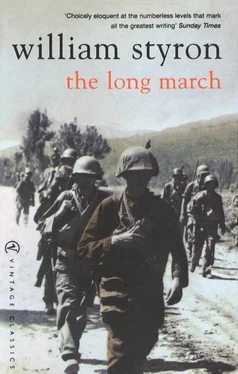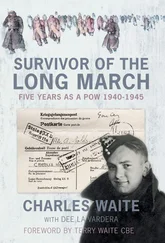William Styron - The Long March
Здесь есть возможность читать онлайн «William Styron - The Long March» весь текст электронной книги совершенно бесплатно (целиком полную версию без сокращений). В некоторых случаях можно слушать аудио, скачать через торрент в формате fb2 и присутствует краткое содержание. Город: New York, Год выпуска: 1952, ISBN: 1952, Издательство: Vintage Classics, Жанр: prose_military, на английском языке. Описание произведения, (предисловие) а так же отзывы посетителей доступны на портале библиотеки ЛибКат.
- Название:The Long March
- Автор:
- Издательство:Vintage Classics
- Жанр:
- Год:1952
- Город:New York
- ISBN:978-0099422792
- Рейтинг книги:3 / 5. Голосов: 1
-
Избранное:Добавить в избранное
- Отзывы:
-
Ваша оценка:
- 60
- 1
- 2
- 3
- 4
- 5
The Long March: краткое содержание, описание и аннотация
Предлагаем к чтению аннотацию, описание, краткое содержание или предисловие (зависит от того, что написал сам автор книги «The Long March»). Если вы не нашли необходимую информацию о книге — напишите в комментариях, мы постараемся отыскать её.
The Long March — читать онлайн бесплатно полную книгу (весь текст) целиком
Ниже представлен текст книги, разбитый по страницам. Система сохранения места последней прочитанной страницы, позволяет с удобством читать онлайн бесплатно книгу «The Long March», без необходимости каждый раз заново искать на чём Вы остановились. Поставьте закладку, и сможете в любой момент перейти на страницу, на которой закончили чтение.
Интервал:
Закладка:
“I think that’s an excellent idea, sir. An excellent idea. In fact I’ve been meaning to suggest something like that to the Colonel for quite some time. As a means of inculcating a sort of group esprit.”
“It’s what they need, Billy.”
“Full marching order, sir?” O’Leary put in seriously.
“No, that’d be a little rough.”
“Aaa-h,” O’Leary said, relieved.
Suddenly Culver heard Mannix’s voice: “Even so—”
“Even so, what?” the Colonel interrupted. Again, the voice was not hostile, only anticipatory, as if it already held the answer to whatever Mannix might ask or suggest.
“Well, even so, Colonel,” Mannix went on mildly, while Culver, suddenly taut and concerned, held his breath, “even without packs thirty-six miles is a long way for anybody, much less for guys who’ve gone soft for the past five or six years. I’ll admit my company isn’t the hottest outfit in the world, but most of them are reserves—”
“Wait a minute, Captain, wait a minute,” the Colonel said. Once more the voice—as cool and as level as the marshy ground upon which they were sitting—carefully skirted any tone of reproach and was merely explicit: “I don’t want you to think I’m taking it out on the Battalion merely because of you, or rather H & S Company. But they aren’t reserves. They’re marines. Comprend?” He arose from the chair. “I think,” he went on flatly, almost gently, “that there’s one thing that we are all tending to overlook these days. We’ve been trying to differentiate too closely between two particular bodies of men that make up the Marine Corps. Technically it’s true that a lot of these new men are reserves—that is, they have an ‘R’ affixed at the end of the ‘USMC’. But it’s only a technical difference, you see. Because first and foremost they’re marines. I don’t want my marines doping off. They’re going to act like marines. They’re going to be fit. If they meet an Aggressor enemy next week they might have to march a long, long way. And that’s what I want this hike to teach them. Comprend?” He made what could pass for the token of a smile and laid his hand easily and for a lingering second on Mannix’s shoulder, in a sort of half-gesture of conciliation, understanding—something—it was hard to tell. It was an odd picture because from where he sat Culver was the only one in the tent who could see, at the same instant, both of their expressions. In the morbid, comfortless light they were like classical Greek masks, made of chrome or tin, reflecting an almost theatrical disharmony: the Colonel’s fleeting grin sculpted cleanly and prettily in the unshadowed air above the Captain’s darkened, downcast face where, for a flicker of a second, something outraged and agonized was swiftly graven and swiftly scratched out. The Colonel’s smile was not complacent or unfriendly. It was not so much as if he had achieved a triumph but merely equilibrium, had returned once more to that devout, ordered state of communion which the Captain’s words had ever so briefly disturbed. At that moment Culver almost liked the Colonel, in some negative way which had nothing to do with affection, but to which “respect,” though he hated the word, was the nearest approach. At least it was an honest smile, no matter how faint. It was the expression of a man who might be fatuous and a ham of sorts, but was not himself evil or unjust—a man who would like to overhear some sergeant say, “He keeps a tight outfit, but he’s straight.” In men like Templeton all emotions—all smiles, all anger—emanated from a priestlike, religious fervor, throbbing inwardly with the cadence of parades and booted footfalls. By that passion rebels are ordered into quick damnation but simple doubters sometimes find indulgence— depending upon the priest, who may be one inclined toward mercy, or who is one ever rapt in some litany of punishment and court-martial. The Colonel was devout but inclined toward mercy. He was not a tyrant, and his smile was a sign that the Captain’s doubts were forgiven, probably even forgotten. But only Culver had seen the Captain’s face: a quick look of both fury and suffering, like the tragic Greek mask, or a shackled slave. Then Mannix flushed. “Yes, sir,” he said.
The Colonel walked toward the door. He seemed already to have put the incident out of his mind. “Culver,” he said, “if you can ever make radio contact with Able Company tell them to push off at 0600. If you can’t, send a runner down before dawn to see if they’ve got the word.” He gave the side of his thigh a rather self-conscious, gratuitous slap. “Well, good night.”
There was a chorus of “Good night, sirs,” and then the Major went out, too, trailed by O’Leary. Culver looked at his watch: it was nearly three o’clock.
Mannix looked up. “You going to try and get some sleep, Tom?”
“I’ve tried. It’s too cold. Anyway, I’ve got to take over the radio watch from Junior here. What’s your name, fellow?”
The boy at the radio looked up with a start, trembling with the cold. “McDonald, sir.” He was very young, with pimples and a sweet earnest expression; he had obviously just come from boot camp, for he had practically no hair.
“Well, you can shove off and get some sleep, if you can find a nice warm pile of pine needles somewhere.” The boy sleepily put down his earphones and went out, fastening the blackout flap behind him.
“I’ve tried,” Culver repeated, “but I just can’t get used to sleeping on the ground any more. I’m getting old and rheumatic. Anyway, the Old Rock was in here for about two hours before you came, using up my sack time while he told the Major and O’Leary and me all about his Shanghai days.”
“He’s a son of a bitch.” Mannix morosely cupped his chin in his hands, blinking into space, at the bare canvas wall. He was chewing on the butt of a cigar. The glare seemed to accentuate a flat Mongoloid cast in his face; he looked surly and tough and utterly exhausted. Shivering, he pulled his field jacket closer around his neck, and then, as Culver watched, his face broke out into the comical, exasperated smile which always heralded his bitterest moments of outrage —at the Marine Corps, at the system, at their helpless plight, the state of the world—tirades which, in their unqualified cynicism, would have been intolerable were they not always delivered with such gusto and humor and a kind of grisly delight. “Thirty… six… miles,” he said slowly, his eyes alive and glistening, “ thirty… six… miles! Christ on a crutch! Do you realize how far that is? Why that’s as far as it is from Grand Central to Stamford, Connecticut! Why, man, I haven’t walked a hundred consecutive yards since 1945. I couldn’t go thirty-six miles if I were sliding downhill the whole way on a sled. And a forced march, mind you. You just don’t stroll along, you know. That’s like running. That’s a regulation two-and-a-half miles per hour with only a ten-minute break each hour. So H & S Company is fouled up. So maybe it is. He can’t take green troops like these and do that. After a couple of seven- or ten- or fifteen-mile conditioning hikes, maybe so. If they were young. And rested. Barracks-fresh. But this silly son of a bitch is going to have all these tired, flabby old men flapping around on the ground like a bunch of fish after the first two miles. Christ on a frigging crutch!”
“He’s not a bad guy, Al,” Culver said,
“he’s just a regular. Shot in the ass with the Corps. A bit off his nut, like all of them.” But Mannix had made the march seem menacing, there was no doubt about that, and Culver—who for the moment had been regarding the hike as a sort of careless abstraction, a prolonged evening’s stroll—felt a solid dread creep into his bones, along with the chill of the night. Involuntarily, he shuddered. He felt suddenly unreal and disoriented, as if through some curious second sight or seventh sense his surroundings had shifted, ever so imperceptibly, into another dimension of space and time. Perhaps he was just so tired. Freezing marsh and grass instead of wood beneath his feet, the preposterous cold in the midst of summer, Mannix’s huge distorted shadow cast brutishly against the impermeable walls by a lantern so sinister that its raging noise had the sound of a typhoon at sea—all these, just for an instant, did indeed contrive to make him feel as if they were adrift at sea in a dazzling, windowless box, ignorant of direction or of any points of the globe, and with no way of telling. What he had had for the last years—wife and child and home—seemed to have existed in the infinite past or, dreamlike again, never at all, and what he had done yesterday and the day before, moving wearily with this tent from one strange thicket to a stranger swamp and on to the green depths of some even stranger ravine, had no sequence, like the dream of a man delirious with fever. All time and space seemed for a moment to be enclosed within the tent, itself unmoored and unhelmed upon a dark and compassless ocean.
Читать дальшеИнтервал:
Закладка:
Похожие книги на «The Long March»
Представляем Вашему вниманию похожие книги на «The Long March» списком для выбора. Мы отобрали схожую по названию и смыслу литературу в надежде предоставить читателям больше вариантов отыскать новые, интересные, ещё непрочитанные произведения.
Обсуждение, отзывы о книге «The Long March» и просто собственные мнения читателей. Оставьте ваши комментарии, напишите, что Вы думаете о произведении, его смысле или главных героях. Укажите что конкретно понравилось, а что нет, и почему Вы так считаете.






![Джеффри Арчер - The Short, the Long and the Tall [С иллюстрациями]](/books/388600/dzheffri-archer-the-short-the-long-and-the-tall-s-thumb.webp)





